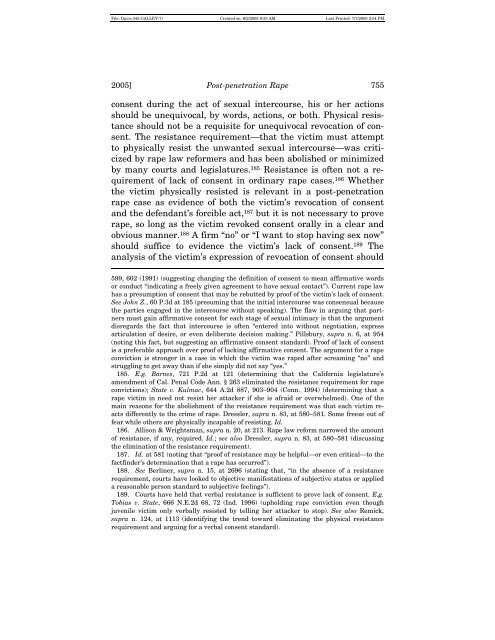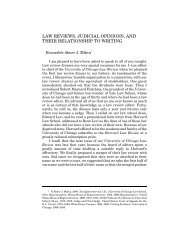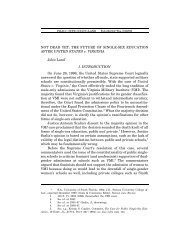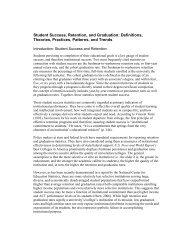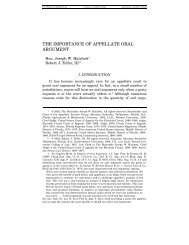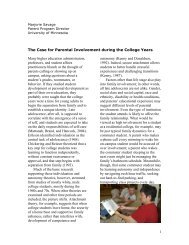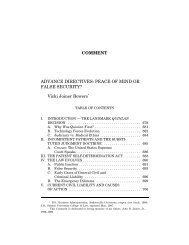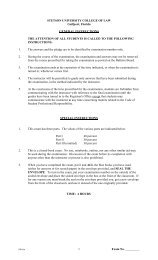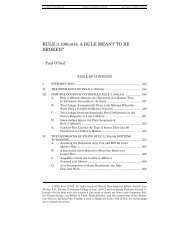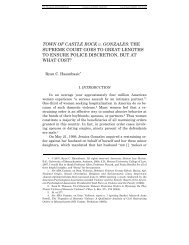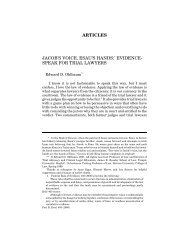the evolution of post-penetration rape law - Stetson University ...
the evolution of post-penetration rape law - Stetson University ...
the evolution of post-penetration rape law - Stetson University ...
You also want an ePaper? Increase the reach of your titles
YUMPU automatically turns print PDFs into web optimized ePapers that Google loves.
File: Davis.343.GALLEY(7) Created on: 6/2/2005 9:33 AM Last Printed: 7/7/2005 2:54 PM2005] Post-<strong>penetration</strong> Rape 755consent during <strong>the</strong> act <strong>of</strong> sexual intercourse, his or her actionsshould be unequivocal, by words, actions, or both. Physical resistanceshould not be a requisite for unequivocal revocation <strong>of</strong> consent.The resistance requirement—that <strong>the</strong> victim must attemptto physically resist <strong>the</strong> unwanted sexual intercourse—was criticizedby <strong>rape</strong> <strong>law</strong> reformers and has been abolished or minimizedby many courts and legislatures. 185 Resistance is <strong>of</strong>ten not a requirement<strong>of</strong> lack <strong>of</strong> consent in ordinary <strong>rape</strong> cases. 186 Whe<strong>the</strong>r<strong>the</strong> victim physically resisted is relevant in a <strong>post</strong>-<strong>penetration</strong><strong>rape</strong> case as evidence <strong>of</strong> both <strong>the</strong> victim’s revocation <strong>of</strong> consentand <strong>the</strong> defendant’s forcible act, 187 but it is not necessary to prove<strong>rape</strong>, so long as <strong>the</strong> victim revoked consent orally in a clear andobvious manner. 188 A firm “no” or “I want to stop having sex now”should suffice to evidence <strong>the</strong> victim’s lack <strong>of</strong> consent. 189 Theanalysis <strong>of</strong> <strong>the</strong> victim’s expression <strong>of</strong> revocation <strong>of</strong> consent should599, 602 (1991) (suggesting changing <strong>the</strong> definition <strong>of</strong> consent to mean affirmative wordsor conduct “indicating a freely given agreement to have sexual contact”). Current <strong>rape</strong> <strong>law</strong>has a presumption <strong>of</strong> consent that may be rebutted by pro<strong>of</strong> <strong>of</strong> <strong>the</strong> victim’s lack <strong>of</strong> consent.See John Z., 60 P.3d at 185 (presuming that <strong>the</strong> initial intercourse was consensual because<strong>the</strong> parties engaged in <strong>the</strong> intercourse without speaking). The f<strong>law</strong> in arguing that partnersmust gain affirmative consent for each stage <strong>of</strong> sexual intimacy is that <strong>the</strong> argumentdisregards <strong>the</strong> fact that intercourse is <strong>of</strong>ten “entered into without negotiation, expressarticulation <strong>of</strong> desire, or even deliberate decision making.” Pillsbury, supra n. 6, at 954(noting this fact, but suggesting an affirmative consent standard). Pro<strong>of</strong> <strong>of</strong> lack <strong>of</strong> consentis a preferable approach over pro<strong>of</strong> <strong>of</strong> lacking affirmative consent. The argument for a <strong>rape</strong>conviction is stronger in a case in which <strong>the</strong> victim was <strong>rape</strong>d after screaming “no” andstruggling to get away than if she simply did not say “yes.”185. E.g. Barnes, 721 P.2d at 121 (determining that <strong>the</strong> California legislature’samendment <strong>of</strong> Cal. Penal Code Ann. § 263 eliminated <strong>the</strong> resistance requirement for <strong>rape</strong>convictions); State v. Kulmac, 644 A.2d 887, 903–904 (Conn. 1994) (determining that a<strong>rape</strong> victim in need not resist her attacker if she is afraid or overwhelmed). One <strong>of</strong> <strong>the</strong>main reasons for <strong>the</strong> abolishment <strong>of</strong> <strong>the</strong> resistance requirement was that each victim reactsdifferently to <strong>the</strong> crime <strong>of</strong> <strong>rape</strong>. Dressler, supra n. 83, at 580–581. Some freeze out <strong>of</strong>fear while o<strong>the</strong>rs are physically incapable <strong>of</strong> resisting. Id.186. Allison & Wrightsman, supra n. 20, at 213. Rape <strong>law</strong> reform narrowed <strong>the</strong> amount<strong>of</strong> resistance, if any, required. Id.; see also Dressler, supra n. 83, at 580–581 (discussing<strong>the</strong> elimination <strong>of</strong> <strong>the</strong> resistance requirement).187. Id. at 581 (noting that “pro<strong>of</strong> <strong>of</strong> resistance may be helpful—or even critical—to <strong>the</strong>factfinder’s determination that a <strong>rape</strong> has occurred”).188. See Berliner, supra n. 15, at 2696 (stating that, “in <strong>the</strong> absence <strong>of</strong> a resistancerequirement, courts have looked to objective manifestations <strong>of</strong> subjective states or applieda reasonable person standard to subjective feelings”).189. Courts have held that verbal resistance is sufficient to prove lack <strong>of</strong> consent. E.g.Tobias v. State, 666 N.E.2d 68, 72 (Ind. 1996) (upholding <strong>rape</strong> conviction even thoughjuvenile victim only verbally resisted by telling her attacker to stop). See also Remick,supra n. 124, at 1113 (identifying <strong>the</strong> trend toward eliminating <strong>the</strong> physical resistancerequirement and arguing for a verbal consent standard).


